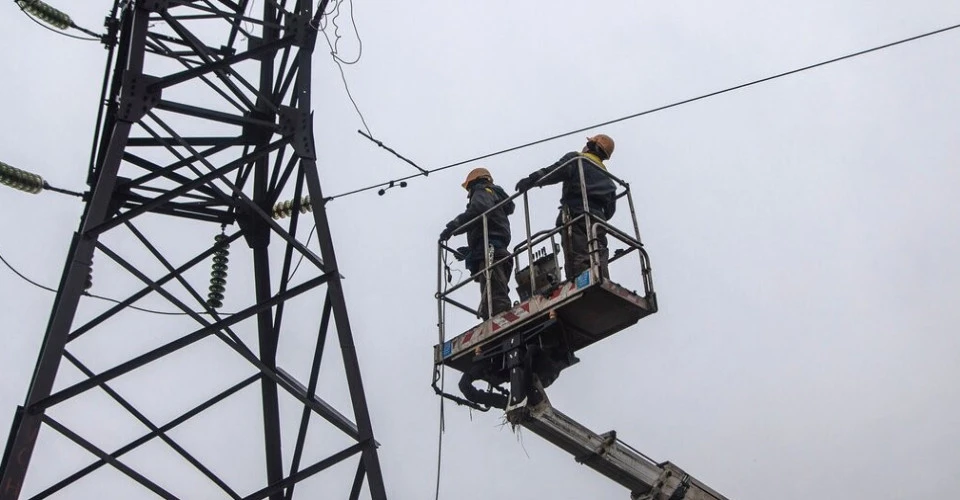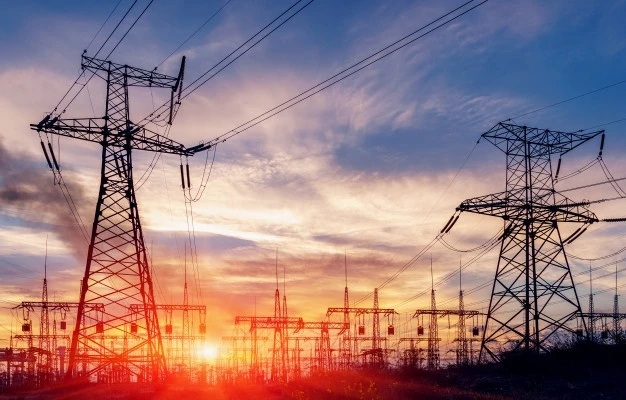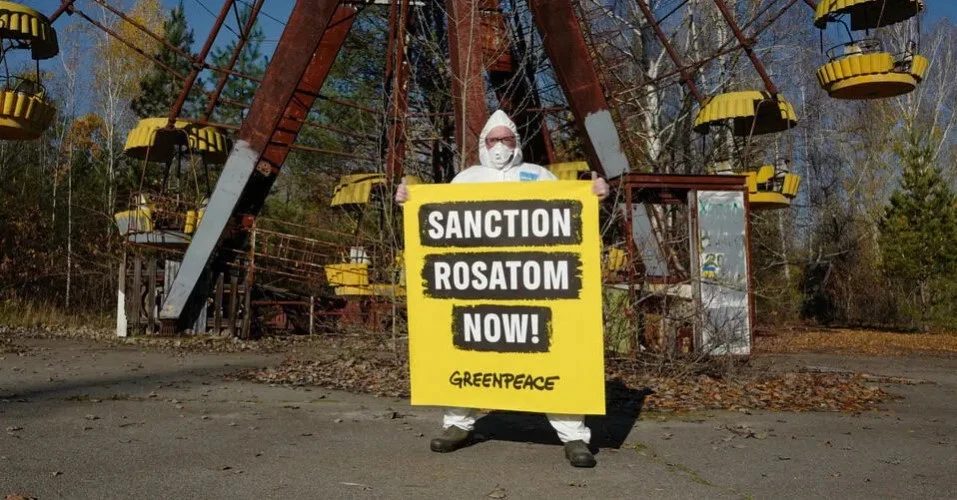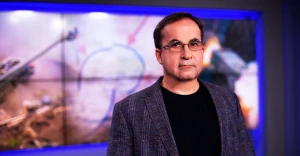
Winter in Ukraine and sanctions against Rosatom. Interview with Alan Riley, Professor at the College of Europe
Alan Riley is a senior fellow at the Atlantic Council Global Energy Center, a visiting professor at the College of Europe in Natolin, Poland and a columnist for the Wall Street Journal, the New York Times and the Financial Times
In an interview for Espreso Global's youtube-channel he shares his thoughts and assumptions about winter in Ukraine, and the potential of rebuilding the Ukrainian energy system.
The text was prepared by Olha Rura. The conversation was held with the assistance of the Dixi Group think tank on the eve of the Energy Security Dialogue 2023, which will take place in Kyiv on December 12. Espreso is a media partner of the conference.
Main topics which will be discussed:
-
What expect Ukraine during this winter
-
Strategies for resilience for the Ukrainian energy system
-
Ukraine's role in European energy security
-
Opportunities for green energy development in Ukraine
-
Importance of decentralized power generation
-
Future sanctions against Rosatom
What do you think about winter in Ukraine this year? Will it be tougher than the previous one?
It could be. There is a kind of fantastic narrative but true one of the heroic, valiant efforts of the Ukrainian stage, Ukrainian energy companies, and, firstly, the engineers often on the front line. Many of them have been killed keeping the networks up and running. That's all true.
Efforts have been made to keep the electricity network in place, a lot of work has been done, and many repairs have been carried out. One has to look at the fundamental vulnerabilities of the system. What concerns me a lot is the difficulty I see in the current situation, at the beginning of the winter heating season. The current winter heating season is worse than it was last year, although a lot of power generation capacity has been restored. It is still less than we had at the beginning of the winter heating season of last year.
The problem is that Russians almost certainly have stockpiled more missiles and more drones and just waiting to work out where they are to hit the infrastructure during this winter. I think this is a lot of the danger. Of course, Kyiv itself has a lot of air defense around it, whilst other Ukrainian cities have less. It's extremely difficult to ensure air defense across many energy assets whilst.
We must understand the focus on the network. The danger is in the attack on the assets themselves and the power generation capacity. This is a real concern for this winter now. Some things can be done. We can look at potentially increasing imports of electricity from EU countries and increased trading limits capacity for special emergency arrangements as well, but we also have to look at the issue of increased power generation capacity. It is difficult, of course. What makes it worse is the historical links through the Soviet Union. Russians know pretty much where everything is located. That's, by the way, the interesting parallel to state on state.

Power grid repair.
Photo: suspilne.media
When the British and Germans were cheerfully bombing each other's power networks, neither the UK nor Germany knew where everything was and how everything worked. There's a great story about the German network, despite the British and Americans having quite a good understanding. JP Morgan financed most of the German (panel) works in the 1920s-30s, so they had all the German power plans in New York, so they should have helped. However, the fact is that they didn't understand the vulnerabilities in the system in granular detail, in the way that the Russians know about the Ukrainian system now. The Allied powers were bombing a lot of the network without understanding the vulnerable points, which would have made their bombing much more devastating. Unfortunately, the Russians know that about the Ukrainian network. That is a huge part of the trouble here, in terms of the vulnerability of the power networks.
What is the main challenge? Is it the Russian bombs or maybe the system that needs to be changed?
The main challenge besides the fact of the threat is dealing with the threat. Drawing parallels with World War II, establishing networks with camouflage capabilities becomes essential for providing a degree of sort of hiding capacity to the networks. This is possible. The difficulty for Britain after the Second World War was removing many transformers into concrete bunkers to protect them from the actions of the enemy which you have known for a long time. The cost of moving these things became huge because they were all kind of fixed in place with approximately 100 tons of concrete.
So, there are ways of doing that and also camouflage and so forth. The question is to what extent can you build a mixture of parallel networks and distributed energy using additional power generation capacity? There are lots of things that we could do with that. The government is largely focused on the networks and the transformers, but, for me, there are bigger opportunities to do things. The war, unfortunately, is going to continue for some time, so the argument for dealing with this is not about the short-term perspective, but about the long-term one. It's not just for this winter. It is for next winter. We think about how to do this and how to make it work.
About long-term decisions, what can you say about the post-war energy structure in the EU, and what's the role of Ukraine in this system?
The Ukrainian system could be positive indeed. We get used to Ukraine having about two months' worth of storage, and this, of course, represents the gas storage capacity for an average winter, providing a buffer in case of a cold winter.
The whole idea was that there would be a two-month worth of storage in Ukraine and there would be huge supplies of Russian gas through the Ukrainian network into Europe. That's how the system was supposed to work. Now, if to cut off the largely Ukrainian and Russian systems what we've got is inadequate amounts of gas storage.
We had the potential to bring Norwegian LNG gas and gas fire through the Balkan network into Ukraine. We can expand the Ukrainian storage, which is already Europe's largest — about 32 billion cubic meters. Furthermore, we can extend it by about 20 billion cubic meters of capacity, and it becomes a huge energy security hedge for Europe. That's already happening because European storage is now 99% full and there is additional European gas going into Ukrainian storage, so it becomes a huge energy security hedge for Ukraine. That is something that has a lot of potential attraction for your future and could help.
The other issue is for a whole host of reasons: partly to do with corruption, partly to do with bureaucratic dysfunctionality, and partly to do with Russian meddling.
There is a lot of gas in Ukraine and it can be competently increased and developed. Ukraine itself can be a gas supplier to the European Union. A lot of people are focusing on the energy transition and so forth because that is crucial. However, it's worth remembering that as long as we don't have cheap grid-level battery storage, we need balancing capacity, which will be principally gas.
So, gas continues to play a crucial role in the European energy market for a very long time. The idea that somehow we're just going to be able to deploy renewables will not work unless you have grid-level cheap-level battery storage, and that does not exist. It may happen, but that is not on a 10-20-year timescale at least, so gas persists in playing a significant role in the network whatever else is going to happen, and it's part of European supply security. That is the area where Ukraine can play a very significant role.
Could we focus more on the topic of electricity itself, rather than delving into discussions about exports and imports?
It's part of the mosaic. There are several advantages to Ukrainian reconstruction provides huge opportunities.
One of the difficulties in Europe is both renewables and any development of energy generation, whether it's wind or solar or whatever it is. Coping with difficulties with permitting and planning processes takes forever. Whereas Ukrainian reconstruction could not just rebuild the energy infrastructure but do it on a greener platform. Ukrainian infrastructure and the investors should be interested not only in building new power generation capacity for Ukraine but also in exports. Considering the difficulty of developing sufficient power generation capacity in Europe, the ability to use reconstructions and the opportunity to build it in Ukraine and then export it to the European Union makes a lot of sense.
Ukraine can add significantly to power generation capacity to meet all the green targets and underpin European supply security.

Ukrainian power grids.
Photo: freepik
If Ukraine plans to join the EU in the future, do we have to reform our energy sector to be greener and make it according to European rules?
Yes. Ukraine should try to go for the latest technology. When Estonia's Independence was restored in 1991, Toomas Hendrik Ilves — the former Estonian president said that they were offered a sort of up-to-the-date electric mechanical telecommunication system from Finland, but they decided to give it up. The reason was the desire to create more opportunities for the future. They didn't want to have a legacy system, which was past state-of-the-art and was much better than our Soviet system. They thought of the long-term perspective in order not to be passive users, but creators.
That insight applies equally to the energy section in Ukraine. What you don't want is a bog-standard solar or wind power. It would be best if you aimed for the most advanced, ideally without supply chains from China. The government needs to raise the standards as high as possible to push all the investment towards the most advanced technologies.
In addition, negotiations with the European Union about creating supply chains should take place as well. This helps anchor the development of European production at a very high level, which involves more advanced research and development of products coming out into the supply chains. More advanced solar panels, wind turbines, biofuels, and ext. may reinforce Ukraine as the technological edge of alternative energy developments. Then you can potentially use the reconstruction, which would massively enhance Ukraine's opportunities for the future. It's crucial not to fall into a legacy trap of taking stuff that is just OK and only complies with the targets. It won't help much in the future and may need to be replaced soon.
Energy decentralization is a widely discussed topic in Ukraine, so what role can territorial communities and local power generations play in the restoration of Ukraine and resistance in the future?
The current debate on Ukraine's energy system resilience centers on decentralized power generation. Due to international support, a lot of local communities and cities obtained freight from 20 to 40-megawatt gas-fired power generators and stuck them in each of the regions and cities, so that the local authorities have access to these.
Then you've got the power generation at a distributed level to an alternative system, and about which the Russians don't have so much information. That's why it's easier to protect. Moreover, they can be used in the post-war period to act as the core balancing element of a solar and wind rollout. Additionally, it may help to develop a distributed system, which can be enhanced with a lot of green power at a distributed level.
Greenpeace protest
Photo: hmarochos.ua
You know that the state-owned Russian company Rosatom is connected with the occupation of the Zaporizhzhia nuclear power plant in Ukraine. Rosatom is a state company directly connected with aggression and war but unfortunately, there are no sanctions against it. Should we expect and if yes, when should we expect sanctions against Rosatom?
I think it is. One appreciable aspect is how the war is operating. Originally, both the Ukrainian expectation and the Western allies expected that the war was going to last a year or one and a half. Now it is understood that, unfortunately, it takes much longer. As for me, it recalibrates the potential for Western action and Western sanctions, so they will get to sanctions against Rosatom. I am not sure when it will happen, but I'm pretty confident we will get that because the incentives to move in that direction rising as the escalation of the war and the radicalization of the Russian state.
- News















































